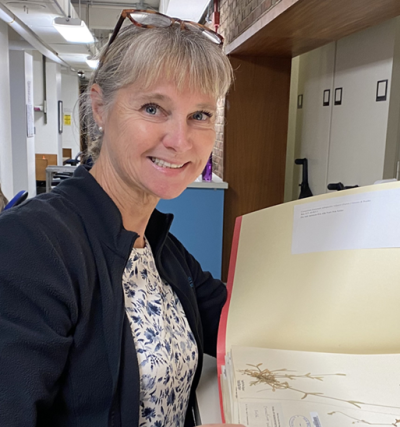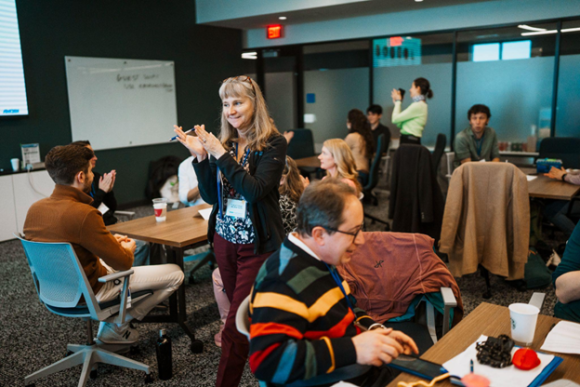During a whirlwind session of “speed networking” at a meeting in Boston in April, ABE Massachusetts teacher Christine Thompson felt transported back to her research days. Like other Master Teacher Fellows in attendance, she moved from table to table as different Amgen staff gave mini-talks about their careers in biotechnology. In a speed dating–style fashion, the sessions were rapid fire—designed to give teachers a quick glimpse into the various roles within the biotech industry.
The timing of the session was ideal for Thompson, who is preparing a new career project for her biotech students at Algonquin Regional High School next year. The project will invite students to explore the range of scientific and nonscientific roles at a single company: Amgen. “It was exciting to be around people who have the same passions that I do,” she reflects. “I chose to visit with people who had different roles in the company—an engineer, a data analyst, an environmental health and safety person, and an analytical chemist—and got a little feel of what they do and what their experiences were to get there, so I could share that with my students when I do my career project.”
The new career project builds on past projects in which Thompson asked students to research companies in the Cambridge, Massachusetts, area—a biotech hub about 30 miles from their school in Northborough. By focusing on only one company this year, Thompson hopes they can appreciate the diversity of possibilities within biotechnology, even in nontechnical roles.
“I want to have the students reflect on what they find interesting or what jobs are appealing to them because I have some students who are passionate about science, but not all of them want to do science,” she says. “They might be interested in financial analysis or marketing. There are plenty of careers, even in a single company. It's not just about bench science.”
As a former bench scientist turned teacher, Thompson also wants her students to learn about the importance of keeping an open mind. “That’s one of my biggest takeaways from my own experiences and the speed networking session, to keep an open mind,” she explains. “A lot of my students go into college thinking ‘I'm going to do this major,’ and I'm like, ‘Well, you don't know. There might be that amazing professor you talk to who opens up a door that you've never seen in high school.’”

As for Thompson, she attended Clark University in Massachusetts, where she studied biology with a minor in chemistry and English. She enjoyed her organic chemistry, cell biology, and microbiology labs and wanted to explore a career in laboratory research. During her senior year, she participated in an internship at the Worcester Foundation for Biomedical Research. After graduating, she was hired by the same foundation and spent about 12 years working in a lab there.
After some family members suggested she might enjoy teaching, she decided to pivot and has been teaching high school science ever since, for the past 22 years. For more than half of that time, she has taught ABE, and now, as an ABE Master Teacher Fellow, she is working to bring the most cutting-edge bioscience to her students.
“Biology changes all the time,” Thompson reflects. “And one of the great things about ABE is that they provide valuable resources for high school students to explore some of the latest in biotechnology.”
Thompson’s Fellowship project focuses on CRISPR (an innovative tool that allows scientists to edit genes), combining hands-on labs with models and simulations available on LabXchange. She is working to customize the unit so all her students—from freshman biology students to those in her biotech and AP biology classes—gain exposure to the new technology.
Over the years, Thompson has encouraged her students to keep in touch. “I always tell them: ‘Keep me updated. Send me your publications. You know what you're doing. And when you win the Nobel Prize, I'll say I'm so proud of you.’” And many ABE students email her after they have left the class to say it was the “most helpful class” for their scientific careers. For Thompson, it’s all about the experiential and inquiry-based approach—whether she’s teaching about CRISPR or exploring the vast career opportunities in biotechnology.
